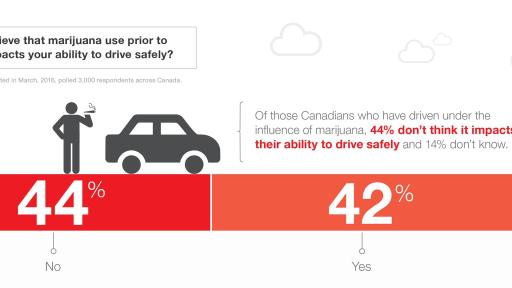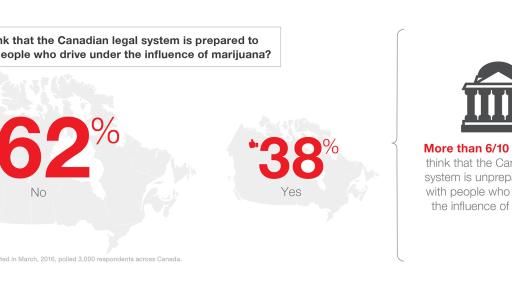New State Farm® survey highlights concerns about impaired driving as federal government considers legalizing marijuana
As federal politicians consider how to make good on Prime Minister Trudeau’s promise to legalize marijuana, it is clear that Canadians are concerned about how this will impact safety on our roads.A new State Farm survey released today found that more than 60 per cent of respondents believe the legal system is unprepared to deal with people who drive under the influence of marijuana. And, close to the same number think there will be an increase in impaired driving if and when marijuana becomes legal.
While most Canadians agree that drinking and driving is dangerous, surprisingly, one out of four survey respondents don’t believe or don’t know that smoking marijuana and driving can be as bad. However, 80 per cent of Canadians believe that marijuana impaired drivers should face legal ramifications for driving while high.
“At a time when legislators and advisors are considering how to legalize marijuana it is clear that Canadians have questions and are concerned about an increase in impaired driving.”
says John Bordignon, Media Relations, State Farm. “We know marijuana impairs judgement and reaction time, so any move to legalize it has to be matched with safeguards to discourage drivers from getting behind the wheel while they are influenced by it. Keeping our roads and streets safe must be a clear priority.”
State Farm asked Canadians their thoughts about marijuana impaired driving. Here’s what they had to say.

State Farm asked Canadians their thoughts about drug impaired driving. Here’s what they had to say.

Infographic: State Farm surveyed Canadians about their drug impaired driving concerns. Here’s what they said.

Do you believe that marijuana use prior to driving impacts your ability to drive safely?

Do you think the Canadian legal system is prepared to deal with people who drive under the influence of marijuana?

Marijuana impaired driving
How prevalent is marijuana impaired driving on our streets? It might be comforting to hear that almost nine out of 10 respondents say they have never driven under the influence of marijuana.
However, some that do drive high, believe it is harmless. Forty-four per cent say it doesn’t impact their ability to drive safely, an additional 14 per cent are unsure.
Additionally, nine out of 10 respondents feel that younger drivers, aged 16-34, are the most likely to drive under the influence of marijuana.
According to research by the Traffic Injury Research Foundation (tirf.ca) here is a breakdown, by age group, of fatally injured drivers whose blood tested positive for marijuana in 2012:
- 28.5% - 16 to 34
- 21.1% - 35 to 49
- 10.6% - 50 to 64
- 1.3% - 65 and over
Prescription and over-the-counter drugs
The survey surprisingly uncovered that about 25 per cent of respondents admit they ignore prescription or over-the-counter drug labels that recommend not driving while on the medication all or some of the time. Still, nine out of 10 respondents indicated that they do not drive while on a prescription or an over-the-counter drug that recommends against driving.
Similar to marijuana, 61 per cent of Canadians think prescription drug-impaired driving is a problem for younger drivers aged 16 to 34.
Additional Resources
This is the first of three news releases State Farm will distribute in 2016 revealing survey results and the opinions of Canadians about their driving habits and road safety.

No comments:
Post a Comment